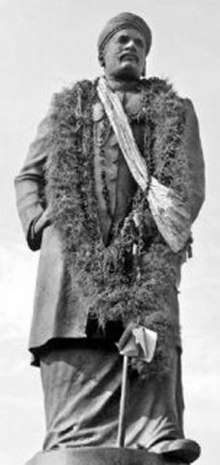Kerala reformation movement
Reformation movement in Kerala refers to a socio-cultural movement that began towards the end of 19th century and lead to large scale changes in the social outlook of southern Indian state of Kerala.
Background
The foundations of social changes in Kerala may be traced back to 16th century. The formation of Malayalam language in its modern form and the development of Bhakti movement under the influence of authors like Thunchaththu Ezhuthachan helped break the monopoly of the Brahmins over literature and knowledge.
The arrival of Europeans beginning with Portuguese followed by Dutch and the English became a catalyst in these changes. The arrival of missionaries from European nations lead to rise in educational institutions in Kerala and the rise of an educated class among caste groups like Ezhavas.[1]
The changes in political order of kerala with the establishment of centralised monarchies in Travancore and cochin which lead to decline of old feudal order was also crucial factor which set the stage for reformation. The Mysorean invasion of Kerala (1766-1792) shook the hold of elites like Brahmins or Namboothiris and Nairs on Kerala society. Mysoreans had scant regard for caste structures in Kerala and many Brahmin and nair families had to flee to southern kerala to avoid persecution by mysorean forces.
In contrast with North India, enlightenment in Kerala was driven by lower castes. Narayana Guru, Ayyankali etc. belonged to caste groups considered lower in the social settings of 19th century Kerala.Hence most of them emphasised on the need for abolition of caste system rather than reformation of caste.[2]
Leaders
Prominent leaders of Kerala reformation include :
List of events
- 1813-1859 : Channar revolt
- 1836 : Formation of Samatwa Samajam by Ayya Vaikundar
- 1846 : First Catholic Saskrit school founded by Kuriakose Elias Chavara
- 1888 : Aruvippuram consecration by Narayana Guru
- 1892 : Swami Vivekananda visits Kerala
- 1893 : "Villu vandi" agitation lead by Ayyankali
- 1896 : Ezhava memorial submitted to Visakham Thirunal
- 1903 : Formation of SNDP
- 1907 :Formation of Sadhujana Paripalana Sangham by Ayyankali
- 1909 :Formation of Prathyaksha Raksha Daiva Sabha by Poykayil Johannan
- 1915 : "Kallu Maala"(Stone chain) agitation lead by Ayyankali
- 1914 : Formation of Nair Service Society
- 1917 : "Misra Bhojan"(community feast) organised by Sahodaran Ayyappan
- 1919 : Formation of Namboothiri yuvajana Sangham under V. T. Bhattathiripad
- 1924 : Vaikom Satyagraha
- 1931-1932 : Guruvayur Satyagraha
- 1936 : Temple Entry Proclamation
References
- ↑ A Sreedhara Menon, "Cultural heritage of Kerala" , p.245
- ↑ http://www.frontline.in/the-nation/three-phases-of-indian-renaissance/article9541139.ece#test
